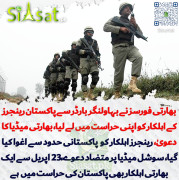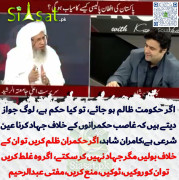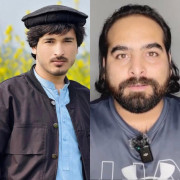zwanalak
Citizen
Return of Taliban (Must Watch)
DEAR BROTHERS AND SISTERS,
SORRY FOR THE CATCHY NAME BUT ACTUALLY IT IS THE NAME OF DOCUMENTORY PRESENTED BY PBS IN OCTOBER 2006. YOU MUST BE WONDERING WHY I HAVE POSTED IT RIGHT NOW. FRANKLY AT THAT TIME PERSONALLY I WAS NOT ABLE TO GRASP ITS IMPACT BUT AS THE OPERATION OF WAZIRSTAN LOOMS ON THE HORRIZON THIS WILL GIVE YOU AN UNDERSTANDING OF WHAT REALLY HAPPEND BEFORE CURRENT SITUATION.
ACTULLY THIS IS THE STORY OF TALIBANS IN TRIBAL AREA OF PAKISTAN. A STORY PORTRAY THAT HOW THIS MENESE CAME TO BEING AND HOW THE GOVERNMENT OF GEN PERVAIZ MUSHARAF MADE DEALS WITH THEM AND WHAT THOES DEALS LED US TO. CURRENTLY WE ARE FACING THE IMPACT OF THESE DEALS. FOR FURTHER CHILLING DETAILS PLEASE CLICK ON THE LINK BELOW AND SEE IT FOR YOUSELF AND THEN DECIDE.
http://www.pbs.org/wgbh/pages/frontline/video/flv/generic.html?s=frol02s40eq5d&continuous=1
====================================================================================================
DOCUMENTORY BACKGROUND AS ON PBS WEBSITE:
FRONTLINE correspondent Martin Smith ("Hunting bin Laden"; "Truth, War and Consequences") returns to the Afghanistan-Pakistan border and presents a rare look inside this secret sanctuary in "Return of the Taliban." In a region long suspected of harboring Osama bin Laden and strictly off-limits to U.S. troops, Smith explores the complex web of alliances among the Taliban, Al Qaeda fighters and the Pakistani military, and analyzes the consequences for U.S. policy.
After 9/11, Pakistani President Pervez Musharraf pledged his country's support to America's fight against Al Qaeda and the Taliban, but he has struggled to control his own military and intelligence services -- which have long supplied money, weapons and military advisers to radical fighters in Afghanistan. For Pakistan, the benefits of cooperation with America have been clear. As President Musharraf tells FRONTLINE, "Defense cooperation has increased between the United States and Pakistan, and ... the debt relief that we got will account for about $4 to $5 billion."
U.S. officials say that today the border region is a key front of the global war on terror. For example, when British police announced that they had foiled a plot to blow up as many as 12 flights to the United States, critical intelligence about the plan had been acquired in the tribal areas. Known terrorists have visited the region regularly, including Muhammad Naeem Noor Khan, who was arrested with plans to attack targets in New Jersey and London, and top Al Qaeda planner Abu Faraj al-Libbi. And despite the presence of 80,000 Pakistani troops, the Taliban and their supporters continue to use the region as a base from which to mount attacks against American troops in Afghanistan.
The tribal areas are inherently difficult to control because of terrain and the fierce autonomy claimed by local leaders. "We used to call them the no-go area, or the inaccessible areas," says Gov. Ali Muhammad Jan Orakzai, the Pakistani political chief of the tribal areas. "We had maps, but they were not very accurate. The borders are unguarded." Culturally, there are also great sympathies for the Taliban cause. According to Steve Coll, the Pulitzer Prize-winning author of Ghost Wars, "when the Pakistan army is fighting the Taliban, they're fighting cousins. They're fighting brethren."
Even under government pressure, some tribesmen continue to provide money and resources to the Taliban and Al Qaeda. After prodding from the United States, in 2004 Pakistan launched a major military offensive against a joint force of tribal militia and Al Qaeda fighters in an effort to take control of an area where Al Qaeda training camps were located. But the offensive failed, and Pakistani authorities turned to negotiation. The army demanded that tribal leaders give up all foreign fighters taking refuge with them, stop cross-border raids against U.S. forces in Afghanistan and lay down their arms. In return, the government agreed to pay the tribesmen more than a half-million dollars.
According to sources familiar with the agreement, the money was destined for Al Qaeda. "This was part of the deal because some of these commanders had ... borrowed money for logistics, for support," says Ismail Khan, an editor at Dawn, Pakistan's largest English-language daily newspaper. "They wanted the money to pay their debt to Al Qaeda."
An uneasy truce followed. The army is largely confined to its barracks, the Taliban exercises control over much of the area and foreign fighters continue to launch cross-border raids. President Musharraf concedes that his strategy of negotiating with the local militants in 2004 has failed. "We thought if we reached an agreement, that would be the end of it," President Musharraf tells FRONTLINE. "Well, it proved wrong." Nonetheless, President Musharraf's government signed a new deal on Sept. 5 with tribal leaders who control another part of the lawless border region, but observers report that the terms are even less favorable to the government and signal a further strengthening of the Taliban's grip on the area.
Frustrated by Pakistan's lack of control in the tribal areas, the U.S. military began direct targeting of Al Qaeda operatives using unmanned Predator aircraft armed with Hellfire missiles. The program was exposed in December 2005 when a local Pakistani journalist and FRONTLINE contributor, Hayat Ullah Khan ("In Search of Al Qaeda"), took photographs showing that a U.S. missile had been used to kill an Al Qaeda operative, directly contradicting the Pakistani military's account of his death. Within days, Hayat Ullah was seized by unknown assailants, and his body was later found dumped by the side of the road; he was wearing government-issue handcuffs. His family tells FRONTLINE that the Pakistani military is responsible for his death, but President Musharraf and the military deny any involvement. Hayat Ullah Khan was the seventh journalist killed in the tribal areas since 2002.
"The United States is beginning to recognize that its project in Afghanistan will fail unless it addresses the sanctuary and support that the Taliban enjoys in Pakistan," says Steve Coll. "But the United States has not yet reached the point where it knows what kind of ... policy it is prepared to carry out."
DEAR BROTHERS AND SISTERS,
SORRY FOR THE CATCHY NAME BUT ACTUALLY IT IS THE NAME OF DOCUMENTORY PRESENTED BY PBS IN OCTOBER 2006. YOU MUST BE WONDERING WHY I HAVE POSTED IT RIGHT NOW. FRANKLY AT THAT TIME PERSONALLY I WAS NOT ABLE TO GRASP ITS IMPACT BUT AS THE OPERATION OF WAZIRSTAN LOOMS ON THE HORRIZON THIS WILL GIVE YOU AN UNDERSTANDING OF WHAT REALLY HAPPEND BEFORE CURRENT SITUATION.
ACTULLY THIS IS THE STORY OF TALIBANS IN TRIBAL AREA OF PAKISTAN. A STORY PORTRAY THAT HOW THIS MENESE CAME TO BEING AND HOW THE GOVERNMENT OF GEN PERVAIZ MUSHARAF MADE DEALS WITH THEM AND WHAT THOES DEALS LED US TO. CURRENTLY WE ARE FACING THE IMPACT OF THESE DEALS. FOR FURTHER CHILLING DETAILS PLEASE CLICK ON THE LINK BELOW AND SEE IT FOR YOUSELF AND THEN DECIDE.
http://www.pbs.org/wgbh/pages/frontline/video/flv/generic.html?s=frol02s40eq5d&continuous=1
====================================================================================================
DOCUMENTORY BACKGROUND AS ON PBS WEBSITE:
FRONTLINE correspondent Martin Smith ("Hunting bin Laden"; "Truth, War and Consequences") returns to the Afghanistan-Pakistan border and presents a rare look inside this secret sanctuary in "Return of the Taliban." In a region long suspected of harboring Osama bin Laden and strictly off-limits to U.S. troops, Smith explores the complex web of alliances among the Taliban, Al Qaeda fighters and the Pakistani military, and analyzes the consequences for U.S. policy.
After 9/11, Pakistani President Pervez Musharraf pledged his country's support to America's fight against Al Qaeda and the Taliban, but he has struggled to control his own military and intelligence services -- which have long supplied money, weapons and military advisers to radical fighters in Afghanistan. For Pakistan, the benefits of cooperation with America have been clear. As President Musharraf tells FRONTLINE, "Defense cooperation has increased between the United States and Pakistan, and ... the debt relief that we got will account for about $4 to $5 billion."
U.S. officials say that today the border region is a key front of the global war on terror. For example, when British police announced that they had foiled a plot to blow up as many as 12 flights to the United States, critical intelligence about the plan had been acquired in the tribal areas. Known terrorists have visited the region regularly, including Muhammad Naeem Noor Khan, who was arrested with plans to attack targets in New Jersey and London, and top Al Qaeda planner Abu Faraj al-Libbi. And despite the presence of 80,000 Pakistani troops, the Taliban and their supporters continue to use the region as a base from which to mount attacks against American troops in Afghanistan.
The tribal areas are inherently difficult to control because of terrain and the fierce autonomy claimed by local leaders. "We used to call them the no-go area
Even under government pressure, some tribesmen continue to provide money and resources to the Taliban and Al Qaeda. After prodding from the United States, in 2004 Pakistan launched a major military offensive against a joint force of tribal militia and Al Qaeda fighters in an effort to take control of an area where Al Qaeda training camps were located. But the offensive failed, and Pakistani authorities turned to negotiation. The army demanded that tribal leaders give up all foreign fighters taking refuge with them, stop cross-border raids against U.S. forces in Afghanistan and lay down their arms. In return, the government agreed to pay the tribesmen more than a half-million dollars.
According to sources familiar with the agreement, the money was destined for Al Qaeda. "This was part of the deal because some of these commanders had ... borrowed money for logistics, for support," says Ismail Khan, an editor at Dawn, Pakistan's largest English-language daily newspaper. "They wanted the money to pay their debt to Al Qaeda."
An uneasy truce followed. The army is largely confined to its barracks, the Taliban exercises control over much of the area and foreign fighters continue to launch cross-border raids. President Musharraf concedes that his strategy of negotiating with the local militants in 2004 has failed. "We thought if we reached an agreement, that would be the end of it," President Musharraf tells FRONTLINE. "Well, it proved wrong." Nonetheless, President Musharraf's government signed a new deal on Sept. 5 with tribal leaders who control another part of the lawless border region, but observers report that the terms are even less favorable to the government and signal a further strengthening of the Taliban's grip on the area.
Frustrated by Pakistan's lack of control in the tribal areas, the U.S. military began direct targeting of Al Qaeda operatives using unmanned Predator aircraft armed with Hellfire missiles. The program was exposed in December 2005 when a local Pakistani journalist and FRONTLINE contributor, Hayat Ullah Khan ("In Search of Al Qaeda"), took photographs showing that a U.S. missile had been used to kill an Al Qaeda operative, directly contradicting the Pakistani military's account of his death. Within days, Hayat Ullah was seized by unknown assailants, and his body was later found dumped by the side of the road; he was wearing government-issue handcuffs. His family tells FRONTLINE that the Pakistani military is responsible for his death, but President Musharraf and the military deny any involvement. Hayat Ullah Khan was the seventh journalist killed in the tribal areas since 2002.
"The United States is beginning to recognize that its project in Afghanistan will fail unless it addresses the sanctuary and support that the Taliban enjoys in Pakistan," says Steve Coll. "But the United States has not yet reached the point where it knows what kind of ... policy it is prepared to carry out."





























